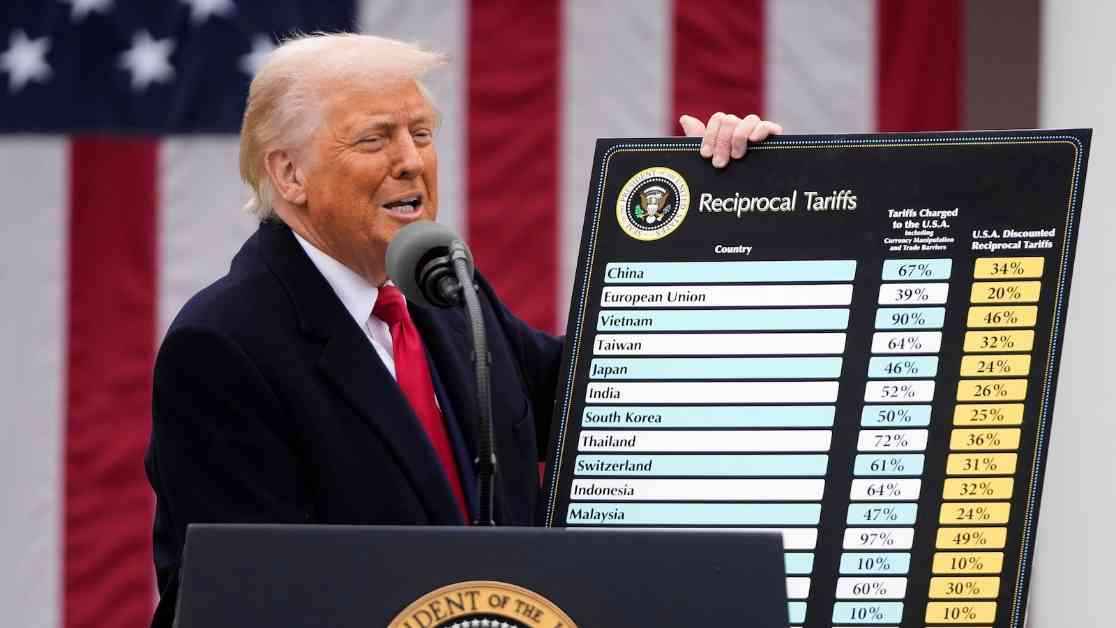Small Business Owners React to Trump Tariffs: A Tale of Triumphs and Tribulations
In a recent gathering of small business owners, Wendy Brugh, the proprietor of Dry Ridge Farm in Marshall, North Carolina, expressed her profound concerns over President Donald Trump’s announcement of tariffs. To Brugh, the tariffs felt like salt being poured into a wound that had just begun to heal. She lamented that these tariffs would escalate the costs of essential resources like fertilizer, feed, construction materials, and tractors, further burdening the farming community already reeling from the aftermath of Hurricane Helene.
Brugh’s sentiments resonate with many small business owners who are grappling with the implications of Trump’s tariff policies. These policies, unveiled against the backdrop of already strained trade relations, have sparked a wave of reactions across various sectors of the economy.
Voices from the Frontline: Small Business Owners Speak Out
Mark Schiefelbein/APBrugh’s apprehensions echo the sentiments of many small business owners, who are faced with the daunting task of navigating an uncertain economic landscape. Mark Schiefelbein/APBrugh’s apprehensions echo the sentiments of many small business owners, who are faced with the daunting task of navigating an uncertain economic landscape. President Trump’s tariffs, described as “kind reciprocal,” target numerous U.S. trading partners, imposing a minimum baseline tariff of 10% on all countries and additional punitive levies on specific nations like China, the European Union, and Taiwan. The President’s rationale for these tariffs is rooted in his assertion that the U.S. has been subjected to unfair trade practices by these countries.
Optimism Amidst Uncertainty: Diverse Perspectives on Tariffs
While some small business owners, like Hendrick Svendsen of Merriam, Kansas, have been compelled to shutter their businesses in response to the tariffs, others, like Duane Paddock, the owner of a Chevrolet dealership in Buffalo, New York, are more sanguine about the prospects. Paddock, who reported record sales in 13 years, sees the tariffs as a potential boon for American manufacturing and the economy at large.
Similarly, James Evans, a U.S.-based manufacturer, envisions a positive trajectory for American industries in the wake of these tariffs, viewing them as a strategic move that could yield long-term benefits. His sentiments are echoed by Rocky Magwood, a shrimp catcher from South Carolina, who anticipates increased demand for domestically caught shrimp.
Challenges and Conundrums: The Realities of Tariffs
However, not all small business owners share the optimistic outlook on tariffs. Leah Ashburn, the president and CEO of Highland Brewing in North Carolina, highlights the challenges inherent in transitioning to American production, particularly in industries reliant on imported materials like aluminum. Ashburn underscores the complexities and costs associated with shifting production to the U.S., cautioning that such transitions may not be feasible in the short term.
As the 10% baseline tariff rate takes effect on April 5, followed by the reciprocal tariffs on April 9, small business owners across the country are bracing themselves for the impact of these policy changes. The implications of these tariffs, both positive and negative, underscore the intricate interplay between global trade dynamics and domestic economic interests.
The diverse array of perspectives offered by small business owners reflects the nuanced and multifaceted nature of the ongoing tariff saga. While some view these tariffs as a catalyst for revitalizing American manufacturing, others are confronted with the stark realities of increased costs and operational challenges. As the economic landscape continues to evolve in response to these policy shifts, the resilience and adaptability of small businesses will be put to the test, shaping the narrative of American entrepreneurship in the years to come.














